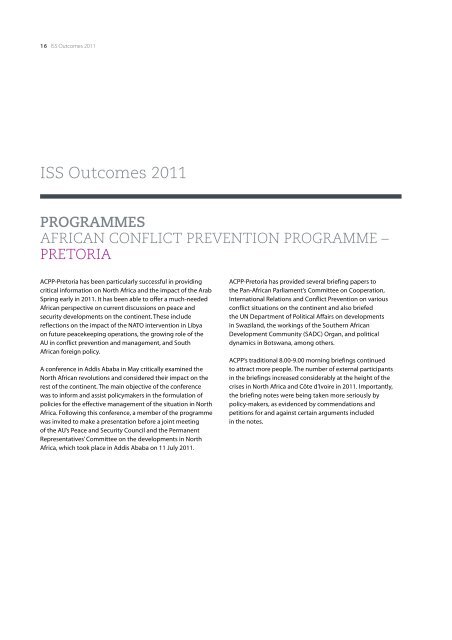programmes - Institute for Security Studies
programmes - Institute for Security Studies
programmes - Institute for Security Studies
You also want an ePaper? Increase the reach of your titles
YUMPU automatically turns print PDFs into web optimized ePapers that Google loves.
16 ISS Outcomes 2011<br />
ISS Outcomes 2011<br />
PROGRAMMES<br />
AFRICAN CONFLICT PREVENTION PROGRAMME –<br />
PRETORIA<br />
ACPP-Pretoria has been particularly successful in providing<br />
critical in<strong>for</strong>mation on North Africa and the impact of the Arab<br />
Spring early in 2011. It has been able to offer a much-needed<br />
African perspective on current discussions on peace and<br />
security developments on the continent. These include<br />
reflections on the impact of the NATO intervention in Libya<br />
on future peacekeeping operations, the growing role of the<br />
AU in conflict prevention and management, and South<br />
African <strong>for</strong>eign policy.<br />
A conference in Addis Ababa in May critically examined the<br />
North African revolutions and considered their impact on the<br />
rest of the continent. The main objective of the conference<br />
was to in<strong>for</strong>m and assist policymakers in the <strong>for</strong>mulation of<br />
policies <strong>for</strong> the effective management of the situation in North<br />
Africa. Following this conference, a member of the programme<br />
was invited to make a presentation be<strong>for</strong>e a joint meeting<br />
of the AU’s Peace and <strong>Security</strong> Council and the Permanent<br />
Representatives’ Committee on the developments in North<br />
Africa, which took place in Addis Ababa on 11 July 2011.<br />
ACPP-Pretoria has provided several briefing papers to<br />
the Pan-African Parliament’s Committee on Cooperation,<br />
International Relations and Conflict Prevention on various<br />
conflict situations on the continent and also briefed<br />
the UN Department of Political Affairs on developments<br />
in Swaziland, the workings of the Southern African<br />
Development Community (SADC) Organ, and political<br />
dynamics in Botswana, among others.<br />
ACPP’s traditional 8.00-9.00 morning briefings continued<br />
to attract more people. The number of external participants<br />
in the briefings increased considerably at the height of the<br />
crises in North Africa and Côte d’Ivoire in 2011. Importantly,<br />
the briefing notes were being taken more seriously by<br />
policy-makers, as evidenced by commendations and<br />
petitions <strong>for</strong> and against certain arguments included<br />
in the notes.

















